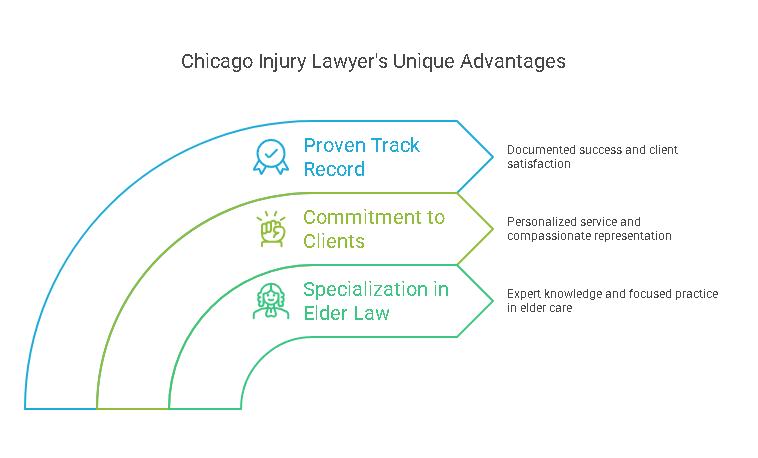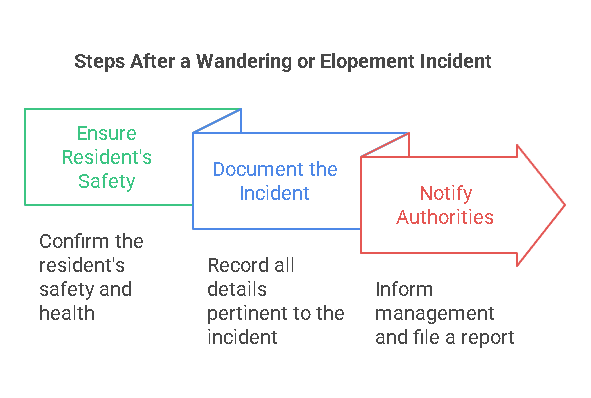Welcome to Chicago’s Personal Injury Attorney, where we understand the unique challenges and dangers of wandering and elopement in nursing homes. If your loved one has been affected, we offer specialized legal services to ensure their safety and hold responsible parties accountable.
Call (312) 261-5656 today for a free, no-obligation consultation about your personal injury case. If you’re unable to travel due to your injuries, we’ll come to you.
Insight Wandering and Elopement in Nursing Homes
Wandering and elopement in nursing homes refer to two distinct behaviors that can pose serious risks to residents. This is particularly true for those with cognitive impairments such as dementia or Alzheimer’s disease.
What is Wandering?
Wandering involves aimless or disoriented movement within the nursing home. This behavior can lead to falls, injuries, or entering unsafe areas.
What is Elopement?
Elopement is more severe and occurs when a resident leaves the nursing home premises entirely. This can expose them to numerous external dangers, including traffic accidents and environmental hazards.
Why Select Chicago’s Personal Injury Attorney for Your Nursing Home Claims?
When facing the troubling issue of wandering or elopement in nursing homes, choosing the right legal representation can make all the difference. At Chicago Injury Lawyer, we stand apart from others in the field for several compelling reasons, ensuring your case receives the attention and expertise it deserves.
Specialization in Elder Law
- Expert Knowledge: We possess a profound understanding of the statutes and regulations specifically affecting nursing homes. This allows us to expertly navigate the complexities of elder law.
- Focused Practice: Our specialization means we are up-to-date on the latest legal precedents and best practices for handling cases involving elder care. This is especially true for cases related to wandering and elopement.
Commitment to Our Clients
- Personalized Service: Each client receives our full attention. We recognize the unique aspects of each case and tailor our legal strategies to ensure a personalized approach that addresses your specific concerns.
- Compassionate Representation: We know how distressing these cases can be for families. Our team approaches each case with sensitivity and understanding, supporting you through every step of the legal process.
Proven Track Record
- Documented Success: Our firm’s history is filled with successful settlements and judgments. This showcases our capability and dedication to achieving the best outcomes for our clients.
- Client Satisfaction: The testimonials from our clients reflect the high level of satisfaction with our representation. They also highlight the positive results we have achieved on their behalf.
Ready to discuss your case? Choosing our Chicago nursing home Elopement lawyer means partnering with a firm that excels in elder law and champions your rights with passion. We are not just attorneys; we are dedicated advocates fighting for justice and compensation for your loved ones.

Causes of Wandering and Elopement in Nursing Homes
Understanding the causes of wandering and elopement is crucial to preventing these dangerous situations. Various factors can contribute to a resident’s decision to wander or elope from a nursing home, leading to life-threatening risks. Here are some key causes:
- Cognitive Decline: Impairments like dementia can diminish a resident’s ability to recognize their environment, leading to confusion and wandering.
- Inadequate Supervision: Insufficient staffing or lack of proper training can fail to prevent residents from wandering or eloping.
- Poor Facility Layout: Complicated layouts can confuse residents, making it easier for them to wander or exit unnoticed.
- Lack of Engagement: Residents who are not engaged or stimulated may wander to find interaction or stimulation.
If you suspect that wandering or elopement may be occurring at your loved one’s nursing home, it’s essential to take immediate action.
Illinois Legal Rights for Wandering and Elopement
Residents of nursing homes in Illinois are protected under specific laws that require facilities to provide a safe environment that minimizes risks of wandering and elopement.
Relevant Legislation:
- Illinois Nursing Home Care Act: This act includes provisions that nursing homes must follow to ensure the safety and well-being of their residents, including adequate supervision and security measures.
Residents’ Legal Rights:
- Right to Adequate Protection: Facilities must implement measures such as secured exits and monitoring systems.
- Right to Personalized Care: Care plans should address individual risks related to wandering and elopement.
- Right to a Safe Environment: Ensuring that the environment is safe and easy to navigate to prevent disorientation.
Other Relevant Legal Protections:
- The Illinois Adult Protective Services Act (320 ILCS 20) provides additional protections for vulnerable adults, including those in nursing homes.
- Federal Regulations: These regulations are outlined in the Code of Federal Regulations, Title 42, Part 483, which requires nursing homes to provide appropriate supervision for residents.
Legal Actions for Families Affected by Wandering and Elopement:
- Illinois Personal Injury Lawsuits: If a resident is harmed as a result of wandering or elopement (such as injuries from falls or accidents), families may file a personal injury claim to recover medical expenses, pain and suffering, and other damages.
- Illinois Wrongful Death Lawsuits: If wandering or elopement leads to fatal consequences, a wrongful death lawsuit may be filed to seek compensation for the loss of life. This includes funeral expenses, loss of companionship, and emotional distress.
If your loved one has experienced wandering or elopement due to nursing home negligence, consult our nursing home wandering and elopement legal team. Act now to protect their rights and ensure their safety.
What to Do After a Wandering or Elopement Incident
Immediate actions are crucial to ensure the resident’s safety and document the incident for any legal action. Steps to Follow:
- Ensure the Resident’s Safety: First, confirm the resident’s safety and health, seeking medical attention if necessary.
- Document the Incident: Record all details pertinent to the incident, including times, conditions, and potential witnesses.
- Notify Authorities: Inform the nursing home management and file a detailed report. If the incident is severe, you should also consider notifying state health services or local authorities.
Taking prompt action is vital to ensure your loved one’s well-being and preserve important evidence for any legal claims. Your immediate steps can make all the difference in seeking justice.

Legal Steps to Take After Nursing Home Wandering and Elopement in Chicago
If a loved one suffers from an incident of wandering or elopement, legal recourse may be necessary.
Legal Actions Include:
- Filing a Complaint: Start by filing a formal complaint with the nursing home and the relevant state bodies.
- Consulting a Lawyer: Our Chicago nursing home Wandering attorney specializing in nursing home negligence can offer guidance on proceeding with a lawsuit for damages.
- Gathering Evidence: It is crucial to collect detailed evidence, including staffing records, surveillance footage, and witness statements.
- Legal Representation: Professional legal representation will be necessary to navigate the complexities of personal injury law and secure appropriate compensation.
Unlock Your Free Case Review Today
Your loved ones deserve to live in a safe and caring environment. If you suspect that their safety has been compromised due to inadequate measures against wandering or elopement, contact the Chicago Injury Lawyer today. Our team is ready to provide the support and legal expertise to protect your loved one and ensure justice is served.
Frequently Asked Questions
What are the most common signs of inadequate safety measures in nursing homes?
Look for frequent unsupervised residents, unlocked doors or gates, and a lack of alarm systems.
How can I prove negligence in a wandering or elopement case?
Evidence such as staff logs, surveillance footage, and witness statements can demonstrate negligence.
What compensation might be available in these cases?
Compensation can cover medical expenses, emotional distress, and, in severe cases, wrongful death.
Is there a statute of limitations for filing a lawsuit in Illinois?
Yes, legal actions typically must be taken within two years of the incident, but specifics can vary, so consulting a lawyer promptly is crucial.



